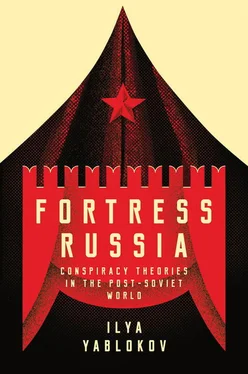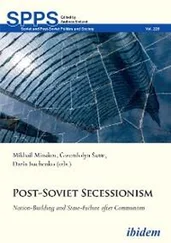In 2012 Vladimir Yakunin, then president of Russian Railway, professor of political science at Moscow State University and owner of a luxurious mansion which included a separate building for fur coats, gave a talk to students at Moscow State University entitled ‘The new global class and challenges to humankind’. This revolved around one idea: the West is building a New World Order and if Russia wants to survive as a great state, it has to acknowledge this, resist it and isolate itself, relying only on its natural resources for survival. Yakunin’s belief is that the world is ruled by a group consisting of its eight most powerful individuals, who meet in a secret room in the Empire State Building in New York (RUSRANDru, 2012). While it was somewhat surprising to hear about the existence of this global conspiracy from a member of Putin’s inner circle (Dawisha, 2015), it was not totally unexpected.
In the years following the collapse of the Soviet Union, anti-Western conspiracy theories gradually moved from the political margins to the centre of official political discourse. By 2017, the image of the West as the conspiring ‘Other’ had become a crucial element of this discourse and was regularly used by political elites, including top-level politicians, to gain public support for their actions and to delegitimize the opposition. This process of bringing anti-Western conspiracy theories into the mainstream began in the mid 2000s. Major developments in Russian politics in the 2000s demonstrate that Fenster’s understanding of conspiracy theories as a populist approach of power is valid not only in relation to US politics, but can also shed light on political developments in post-Communist societies.
Several scholars have noted that the current Russian political regime lacks any clear ideological underpinnings (Krastev, 2011; Shevtsova, 2015). This makes it more flexible than a totalitarian regime would be; it allows citizens to do business, travel abroad and enjoy a somewhat unlimited self-expression. In addition, a positive economic dynamic and the growth of wealth in the 2000s contributed to the popularity of Putin’s policies. However, as the second term of Putin’s presidency approached its end in 2008, against the background of a wave of ‘colour revolutions’ in the CIS countries, the political establishment became concerned about the future, and made the preservation of Putin’s power its major task. As part of this process, with the support of loyal public intellectuals, the Kremlin formulated a powerful narrative which juxtaposed the Russian nation with the West, from whose intrigues only Putin could protect Russia. This stance has been turned into the main ideological crux of the regime.
Daniel Treisman (2011, p. 256) has pointed out that the ruling elites in post-Communist Russia have always kept a close eye on the results of opinion polls; under Putin and Medvedev this tendency became even more pronounced as all major political decisions had, somehow, to be reconciled with the public mood. This concern with public opinion has been reflected in the constant populist appeals on the part of political leaders to the majority of Russians. This tendency peaked in the 2007–8 and 2011–12 electoral cycles when the so-called ‘Putin majority’ became a significant factor in domestic politics. Hence in the 2000s, widespread approval of Putin became a key tool for legitimizing the policies introduced by the Kremlin and securing its control over the country. From 2014 to 2016, when the Ukraine crisis was at its height, the imagined ‘majority’ turned into a real one as support for the Kremlin skyrocketed. Winning the ‘war of the West against Russia’ in Ukraine, and ‘returning Crimea to Russia’, proved to be strong enough incentives to bring together different strata and different generations of Russians.
In official discourse, Putin was represented as the only possible leader and even the embodiment of ‘the Russian people’, whose interests and demands he allegedly fulfilled. Putin’s rhetoric was aimed at gathering together different social elements into the broad category of the ‘Putin majority’. At the beginning of the 2000s, public demand was for a strong, stable state, and greater social equality. Putin’s administrative reforms and attacks on the oligarchs not only partially fulfilled the demand, but also established Putin’s authority. From the mid 2000s, the maintenance of economic and political stability in the country was the key issue for many Russians. Accordingly, pro-Kremlin intellectuals and politicians linked the economic growth of the 2000s with the image of Putin as a successful leader. Hence the popular demand to preserve stability was bound up with the need to keep the current ruling elites in power. This goal was achieved by means of the suppression of democratic institutions and attacks on civil society.
The transition towards greater authoritarianism in the mid 2000s was accompanied by a discourse which contrasted the ‘Putin majority’ to the minority of dissenters who disagreed with the Kremlin’s political agenda. Since 2004, dissenting voices have been seen as the ‘subversive’, ‘conspiring’ Other, something alien to the Russian nation and more loyal to the West than to Russia. This division in Russian society, based on a conspiratorial reading of both past and current events, gradually evolved into a lens through which Russian domestic developments were seen. With Putin’s return to the Kremlin in 2012 the anti-Western conspiracy theories turned into one of the key tools for explaining the need for new legislative initiatives and the suppression of the opposition.
The Kremlin’s reaction to the Ukraine crisis provides a clear illustration of how essential anti-Western conspiracy theories have become for the political establishment in Russia. Putin’s appeal to the Council of the Federation on 1 March 2014 for permission to deploy military force in Ukraine was explained by the Council’s members as a response to the threat of a US invasion of Ukraine, and was supported unanimously (The Council of Federation, 2014). The media campaign supporting Russia’s policies in Ukraine has been framed by pro-Kremlin politicians and media as a retaliation against the collapse of the Soviet Union in 1991, which is now said to have been organized by the West. Through the press and television talk shows, public intellectuals and politicians loyal to the Kremlin have interpreted the Euromaidan movement as the outcome of subversive Western actions aimed at brainwashing Ukrainian citizens and turning them against Russia. The new government of Ukraine, under the leadership of Petro Poroshenko, has been described as a ‘fascist government’ under the protection of the CIA. The intervention in Crimea has been justified by the need to protect Russian ‘compatriots’ from extreme Ukrainian nationalists backed by the West and the NATO fleet. Crimea’s annexation has been described in the state-aligned press as the end of the New World Order in Russia and a key step towards the construction of the Russian nation (Remizov, 2014). The concepts elaborated by US right-wing conspiracy theorists since the mid 2010s have found a place in the rhetoric of Russia’s mainstream intellectuals and politicians.
The impact of events in Ukraine on Russian domestic policies is at least as significant as the shock experienced by Kremlin officials in 2004 during the ‘Orange Revolution’ in Kyiv. Thirteen years ago, the unrest in Kyiv sparked the ‘weaponization’ of anti-Western conspiracy theories against political opponents. In 2014, it has become a ‘weapon of mass destruction’ deployed by the loyal Kremlin media to destroy or suppress opposition in the country.
The political changes in Russia in the decade between the two Ukrainian revolutions, and the Russian political elites’ response to them, allows us to evaluate the role played by anti-Western conspiracy theories in post-Soviet political development. As discussed throughout the book, the change of regime in Ukraine in 2004 was an important factor in triggering a dramatic increase in the use of conspiracy theories as an instrument of social cohesion. These ideas did not appear out of the blue: the notion of a Western conspiracy, as explained in Chapter 1, was a key part of Russian intellectual life for more than two centuries. However, after 1991 it became an important element of the country’s political ideology, exploiting people’s nostalgia for Russia’s past greatness, justifying the authoritarian turn and providing a basis for social cohesion and popular mobilization. In the 2000s, growing nostalgia for the Soviet Union and the absence of public consensus about events of the recent past allowed the Kremlin to stimulate national cohesion based on the fears of conspiracy. As Chapter 3demonstrates, Russia’s political and intellectual elites in the 2000s made a conspiratorial understanding of the Soviet collapse a crucial feature of domestic policies, portraying internal opposition to the Kremlin as a ‘fifth column’ conspiring against the Russian nation. Putin’s definition of the Soviet collapse as ‘a major geopolitical disaster’ transformed the attitude of ordinary Russians towards the event into a key marker of loyalty to the state and the nation. Those citizens who did not see the loss of the Soviet state as a disaster found themselves excluded, at least discursively, from the community of Russian people. They were labelled enemies who were working with the West, which had been instrumental in destroying the Soviet Union.
Читать дальше
Конец ознакомительного отрывка
Купить книгу












